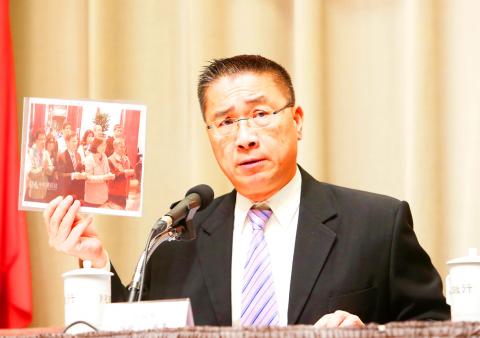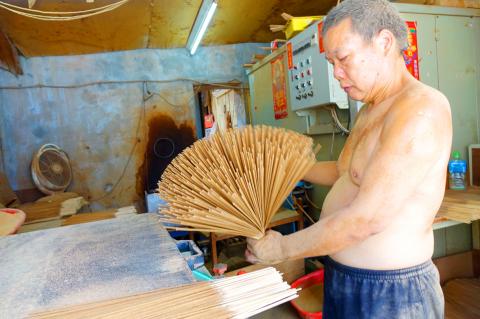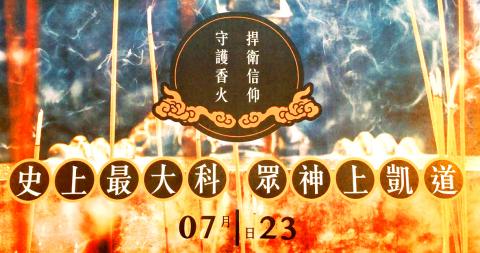The Cabinet yesterday denied accusations that an environmental measure to reduce the burning of incense and joss paper was an attempt to eliminate religious rites, saying that the measures are aimed at reducing air pollution, not interfering with religious freedom.
An Environment Protection Administration (EPA) initiative to reduce the use of incense and “ghost money” to minimize airborne pollutants has given rise to Internet rumors that the government plans to draft a religious associations act and phase out the practice of burning incense.
Dozens of local temples and religious organizations are to protest in front of the Presidential Office Building in Taipei on Sunday to demand the protection of religious traditions.

Photo: CNA
The Cabinet said that the EPA never intended to eliminate incense or joss paper, but only to encourage their reduced use for environmental reasons.
“It is a misunderstanding. The EPA has never banned incense or ghost money. Never. We only want to reduce the use of firecrackers, ghost money and incense due to environmental reasons,” Executive Yuan spokesman Hsu Kuo-yung (徐國勇) said.
Showing photographs of President Tsai Ing-wen (蔡英文) and Premier Lin Chuan (林全) holding incense sticks during the Lunar New Year holiday, Hsu said the government respects and would never attempt to stop religious practice.

Photo: Liu Hsiao-hsin, Taipei Times
The Constitution protects religious freedom and any law limiting this freedom is prohibited, because it would be unconstitutional, Hsu said.
“To live up to their social responsibility, many temples have voluntarily reduced the use of incense, ghost money and firecrackers” without any government orders, Hsu said.
The EPA said the burning of incense and firecrackers produces fine particulate matter containing heavy metals and carcinogenic chemicals, and people exposed to such pollutants often complain of coughing and tearing eyes.

Photo: CNA
Air quality tests show that the concentration of air pollutants at one temple decreased by two-thirds after it voluntarily reduced the number of incense burners, suggesting that air pollution could be mitigated with reduced use of incense, the EPA said.
At a Democratic Progressive Party (DPP) meeting on Wednesday, Tsai said the Cabinet was slow to respond to the rumors.
DPP sources quoted Tsai as saying that the Executive Yuan was passive in explaining the environmental policy, while Minister of the Interior Yeh Jiunn-rong (葉俊榮) failed to promptly quell the rumor that a ban was to be imposed on religious practices.
The president asked the Cabinet to communicate with temples and religious organizations to reduce incense burning without causing misunderstanding.
The quality control of imported incense and ghost paper has to be improved to reduce airborne pollutants, Tsai said.

MAKING WAVES: China’s maritime militia could become a nontraditional threat in war, clogging up shipping lanes to prevent US or Japanese intervention, a report said About 1,900 Chinese ships flying flags of convenience and fishing vessels that participated in China’s military exercises around Taiwan last month and in January have been listed for monitoring, Coast Guard Administration (CGA) Deputy Director-General Hsieh Ching-chin (謝慶欽) said yesterday. Following amendments to the Commercial Port Act (商港法) and the Law of Ships (船舶法) last month, the CGA can designate possible berthing areas or deny ports of call for vessels suspected of loitering around areas where undersea cables can be accessed, Oceans Affairs Council Minister Kuan Bi-ling (管碧玲) said. The list of suspected ships, originally 300, had risen to about 1,900 as

Japan’s strategic alliance with the US would collapse if Tokyo were to turn away from a conflict in Taiwan, Japanese Prime Minister Sanae Takaichi said yesterday, but distanced herself from previous comments that suggested a possible military response in such an event. Takaichi expressed her latest views on a nationally broadcast TV program late on Monday, where an opposition party leader criticized her for igniting tensions with China with the earlier remarks. Ties between Japan and China have sunk to the worst level in years after Takaichi said in November that a hypothetical Chinese attack on Taiwan could bring about a Japanese

Right-wing political scientist Laura Fernandez on Sunday won Costa Rica’s presidential election by a landslide, after promising to crack down on rising violence linked to the cocaine trade. Fernandez’s nearest rival, economist Alvaro Ramos, conceded defeat as results showed the ruling party far exceeding the threshold of 40 percent needed to avoid a runoff. With 94 percent of polling stations counted, the political heir of outgoing Costa Rican President Rodrigo Chaves had captured 48.3 percent of the vote compared with Ramos’ 33.4 percent, the Supreme Electoral Tribunal said. As soon as the first results were announced, members of Fernandez’s Sovereign People’s Party

MORE RESPONSIBILITY: Draftees would be expected to fight alongside professional soldiers, likely requiring the transformation of some training brigades into combat units The armed forces are to start incorporating new conscripts into combined arms brigades this year to enhance combat readiness, the Executive Yuan’s latest policy report said. The new policy would affect Taiwanese men entering the military for their compulsory service, which was extended to one year under reforms by then-president Tsai Ing-wen (蔡英文) in 2022. The conscripts would be trained to operate machine guns, uncrewed aerial vehicles, anti-tank guided missile launchers and Stinger air defense systems, the report said, adding that the basic training would be lengthened to eight weeks. After basic training, conscripts would be sorted into infantry battalions that would take